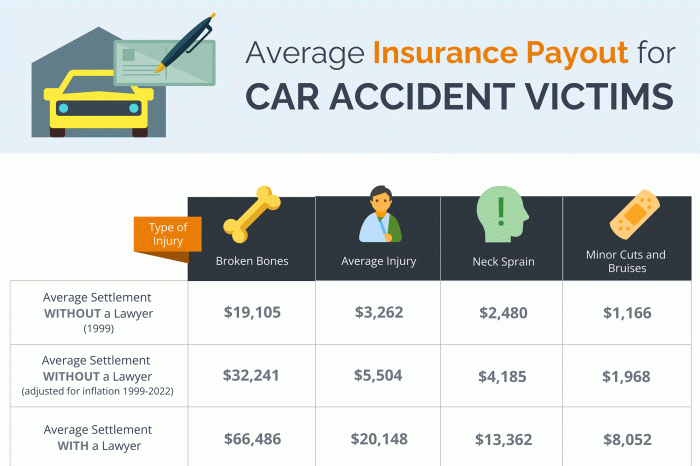Car Accident Compensation sets the stage for this enthralling narrative, offering readers a glimpse into a story that is rich in detail and brimming with originality from the outset. It delves into the intricate world of legal complexities surrounding car accidents, providing invaluable insights into the various types of compensation available, the process of determining liability, and the intricacies of negotiating settlements.
As we delve deeper into this captivating narrative, we will uncover the methods used to calculate economic and non-economic damages, explore the dynamics of negotiating with insurance companies, and shed light on the intricacies of filing a lawsuit. By unraveling the complexities of Car Accident Compensation, we empower victims with the knowledge and tools they need to navigate the legal landscape and seek fair compensation for their injuries.
Types of Car Accident Compensation

Car accident victims may be entitled to various types of compensation for the damages they have suffered. These damages can be broadly classified into two categories: economic and non-economic.
Economic Damages
- Medical expenses: This includes the costs of medical treatment, hospitalization, rehabilitation, and prescription medications related to the accident.
- Lost wages: Compensation for income lost due to the inability to work as a result of the accident.
- Property damage: Reimbursement for the repair or replacement of damaged vehicles or other property.
Non-Economic Damages
- Pain and suffering: Compensation for the physical and emotional distress experienced as a result of the accident.
- Emotional distress: Compensation for psychological trauma, anxiety, depression, and other emotional issues caused by the accident.
- Loss of enjoyment of life: Compensation for the inability to participate in activities and experiences due to the accident.
Determining Liability in Car Accidents
Liability in car accidents refers to the legal responsibility for causing the accident and any resulting damages. Determining liability is crucial for determining who is responsible for compensating the victims.
Factors Determining Liability
Several factors are considered when determining liability in car accidents, including:
- Negligence: This is the failure to exercise reasonable care, which results in harm to another person or property. Negligence can be proven by showing that the driver:
- Owed a duty of care to the other party (e.g., other drivers, pedestrians)
- Breached that duty by failing to act reasonably
- Caused the accident and resulting damages
- Comparative Fault: In some jurisdictions, the concept of comparative fault applies. This means that even if one driver is primarily responsible for the accident, the other driver may also be partially at fault. The percentage of fault is determined based on the specific circumstances of the case.
- Traffic Laws: Violations of traffic laws, such as speeding, running red lights, or driving under the influence, can provide strong evidence of negligence.
- Witness Statements: Eyewitness accounts can provide valuable information about the events leading up to and during the accident.
- Police Reports: Police reports document the details of the accident, including the officer’s observations and conclusions.
Calculating Car Accident Compensation
Determining the amount of compensation you’re entitled to after a car accident involves calculating both economic and non-economic damages. Here’s a breakdown of the methods used:
Economic Damages
- Medical Expenses: These include all costs related to medical treatment, such as hospital stays, doctor’s visits, medication, and rehabilitation.
- Lost Wages: If you’re unable to work due to your injuries, you can claim compensation for the income you’ve lost.
- Property Damage: This covers the repair or replacement of your vehicle and any other property damaged in the accident.
- Out-of-Pocket Expenses: Any expenses incurred as a direct result of the accident, such as transportation costs, childcare, or home modifications, can be included.
Non-Economic Damages
Non-economic damages are more subjective and difficult to quantify. They compensate for the physical, emotional, and psychological harm caused by the accident.
If you’ve been in a car accident, it’s important to know your rights. You may be entitled to compensation for your injuries, lost wages, and pain and suffering. Environmental Justice Issues aside, it’s crucial to seek legal advice as soon as possible after an accident to ensure you receive the compensation you deserve.
- Pain and Suffering: This includes the physical discomfort, emotional distress, and loss of enjoyment of life experienced as a result of the injuries.
- Mental Anguish: Compensation for the emotional distress, anxiety, and depression caused by the accident.
- Loss of Consortium: If the accident has affected your relationship with your spouse or family, you may be entitled to compensation for the loss of companionship and support.
- Disfigurement: This covers any permanent physical scarring or disfigurement resulting from the accident.
Negotiating Car Accident Settlements
Negotiating a settlement after a car accident can be a complex and stressful process. Here’s a guide to help you maximize your compensation while protecting your rights:
Tips for Negotiating
- Gather Evidence: Collect all relevant documents, such as medical records, police reports, and witness statements, to support your claim.
- Know Your Worth: Research comparable settlements and consult with an attorney to determine a fair value for your claim.
- Be Prepared to Negotiate: Don’t accept the first offer from the insurance company. Be prepared to counteroffer and negotiate until you reach a fair agreement.
- Stay Calm and Professional: Keep your emotions in check and maintain a respectful demeanor during negotiations.
- Consider Mediation: If negotiations reach an impasse, consider using a neutral third-party mediator to facilitate a resolution.
Filing a Car Accident Lawsuit
Filing a car accident lawsuit is a significant step that should be considered after exhausting all other options for obtaining fair compensation. It involves initiating legal proceedings against the at-fault party to seek damages for injuries, property damage, and other losses.
Before filing a lawsuit, it’s crucial to gather evidence, including police reports, medical records, witness statements, and any other relevant documentation. Consulting with an experienced car accident attorney is highly recommended to guide you through the process and ensure your rights are protected.
Steps Involved in Filing a Lawsuit
1. Drafting and Filing the Complaint: The lawsuit begins with drafting a complaint that Artikels the legal basis for the claim, the injuries sustained, and the damages sought. This complaint is then filed with the appropriate court.
2. Service of Process: The complaint must be served on the defendant, who has a specified time frame to respond.
3. Discovery Phase: Both parties engage in discovery, which involves exchanging information, documents, and witness lists. Depositions may also be conducted to gather further evidence.
4. Settlement Negotiations: During the discovery phase, settlement negotiations may take place. If a settlement can be reached, the lawsuit can be dismissed.
5. Trial: If a settlement cannot be reached, the case will proceed to trial. The plaintiff presents their case, followed by the defendant. The jury or judge will then determine liability and damages.
6. Judgment and Appeal: If the plaintiff wins, a judgment will be entered against the defendant. The defendant may choose to appeal the decision.
Advantages and Disadvantages of Going to Trial
Advantages:
* Higher Potential Compensation: A successful trial can result in a larger compensation award than a settlement.
* Accountability: Going to trial holds the at-fault party accountable for their actions.
* Legal Precedent: A trial outcome can set a legal precedent for similar cases in the future.
Disadvantages:
* Time-Consuming: Trials can be lengthy and can take months or even years to complete.
* Unpredictable Outcome: The outcome of a trial is uncertain, and there is always the risk of losing.
* Stressful: The trial process can be emotionally and financially stressful.
Special Considerations for Car Accident Compensation
Determining car accident compensation can be influenced by several factors, including insurance coverage and personal injury protection (PIP).
When you’re in a car accident, you may be entitled to compensation for your injuries and damages. If you’re concerned about the impact on endangered species, you should also be aware of the Endangered Species Act Protections . These protections can help ensure that the species you care about are not harmed by the accident or its aftermath.
If you’re involved in a car accident, be sure to contact an attorney to discuss your rights and options.
Insurance coverage plays a crucial role as it dictates the amount of compensation available to victims. In cases where the at-fault driver has sufficient insurance coverage, victims may be able to recover damages up to the policy limits. However, if the at-fault driver is uninsured or underinsured, victims may face challenges in obtaining adequate compensation.
Uninsured and Underinsured Motorists, Car Accident Compensation
Victims of uninsured or underinsured motorists often encounter difficulties in obtaining fair compensation. In such cases, victims may need to explore other options, such as filing a claim with their own insurance company or pursuing legal action against the at-fault driver.
Filing a claim with your own insurance company may be an option if you have uninsured/underinsured motorist (UM/UIM) coverage. This coverage can provide compensation for damages caused by uninsured or underinsured drivers.
Pursuing legal action against the at-fault driver may also be necessary if other options are not available. However, it’s important to note that this process can be complex and time-consuming.
Final Thoughts
In the concluding chapter of our exploration, we reflect on the profound impact of Car Accident Compensation on the lives of victims. We revisit the key concepts discussed throughout this narrative, reinforcing the importance of understanding the legal framework surrounding car accidents. By empowering victims with knowledge and practical guidance, we strive to create a more equitable and just system for those who have suffered the consequences of negligence on the road.
Detailed FAQs
What are the different types of compensation available to victims of car accidents?
Car accident compensation encompasses a wide range of damages, including economic losses such as medical expenses, lost wages, and property damage, as well as non-economic losses such as pain and suffering, emotional distress, and loss of enjoyment of life.
How is liability determined in car accidents?
Liability in car accidents is typically determined based on the concept of negligence, which refers to the failure to exercise reasonable care. Factors considered include the actions of the drivers involved, any violations of traffic laws, and the presence of contributing factors such as road conditions or vehicle defects.
How are economic damages calculated in car accident cases?
Economic damages are calculated by tallying up the actual expenses incurred as a result of the accident, such as medical bills, lost wages, and property damage. In some cases, future economic losses may also be considered, such as the cost of ongoing medical care or the loss of future earning capacity.
How are non-economic damages assessed in car accident cases?
Non-economic damages are more subjective and challenging to quantify than economic damages. They are typically assessed based on the severity of the injuries, the impact on the victim’s quality of life, and the testimony of medical experts and the victim themselves.
What are the advantages and disadvantages of filing a lawsuit for car accident compensation?
Filing a lawsuit can be a more time-consuming and expensive process than negotiating a settlement with an insurance company. However, it may be necessary in cases where the insurance company is disputing liability or offering an inadequate settlement. A lawsuit also provides the opportunity for the victim to seek a wider range of damages, including punitive damages.
Car Accident Compensation aims to restore victims to their pre-accident state, both physically and financially. However, it’s important to note that corporations also have a responsibility to minimize their environmental impact. Corporate Environmental Responsibility involves adopting sustainable practices that protect the planet and future generations.
By embracing these principles, companies can not only reduce their carbon footprint but also contribute to the overall well-being of society, which ultimately benefits everyone, including victims of car accidents who deserve fair and adequate compensation.
Car accident compensation is essential to protect yourself financially after an accident. While you’re recovering from injuries, you may need to take time off work and pay for medical expenses. That’s where Environmental Auditing and Compliance comes in. These professionals can help you ensure that your company is compliant with environmental regulations and avoid costly fines.
Ultimately, car accident compensation can provide peace of mind and financial security during a difficult time.
Car accident compensation can be a complex and challenging process, especially if you’re dealing with insurance companies. If you’re looking for legal help, you may want to consider reaching out to an attorney who specializes in Climate Change Litigation . These attorneys are familiar with the legal complexities of car accident cases and can help you get the compensation you deserve.
Even if you’re not dealing with a climate change-related car accident, these attorneys can provide valuable guidance and support.
If you’ve been involved in a car accident, you may be entitled to compensation for your injuries. The amount of compensation you receive will depend on a number of factors, including the severity of your injuries, the fault of the other driver, and your own insurance coverage.
If you are facing foreclosure on your home, you may be able to get help from a lawyer who specializes in Foreclosure laws . A lawyer can help you understand your rights and options, and can negotiate with your lender on your behalf.
Car accident compensation can help you cover the costs of your medical bills, lost wages, and other expenses.



